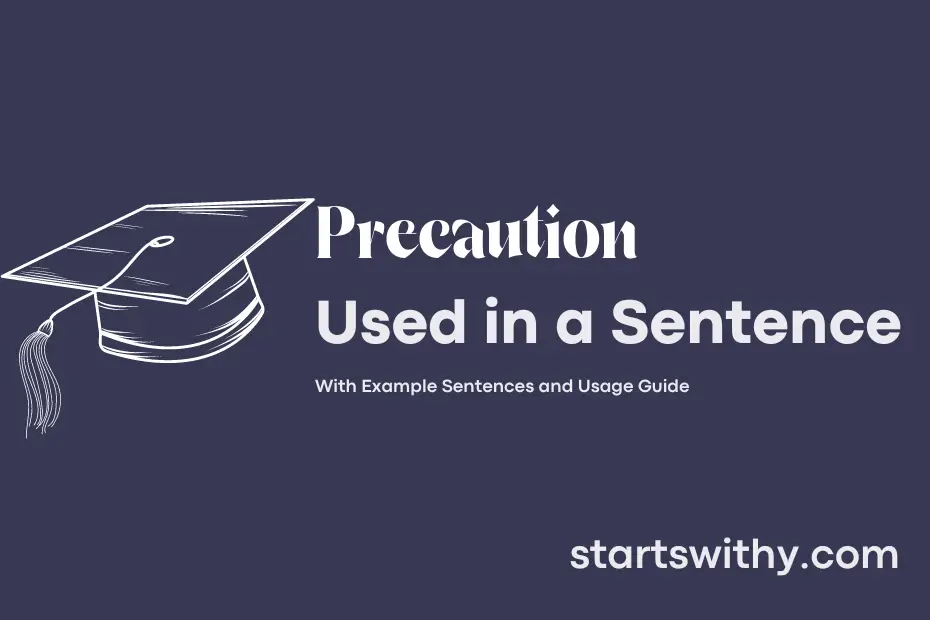Have you ever heard the term “precaution” and wondered what it really means? In simple terms, a precaution is a measure taken in advance to prevent potential danger or harm.
In our daily lives, we often encounter situations where taking precautions can significantly reduce the risks we face. Understanding the concept of precautions and knowing when and how to implement them can help us navigate our environment safely and confidently.
7 Examples Of Precaution Used In a Sentence For Kids
- Precaution is like wearing a helmet while cycling.
- Always hold an adult’s hand when crossing the road, it’s a good precaution.
- Remember to wash your hands before eating, it’s a simple precaution.
- Look both ways before crossing the street, it’s an important precaution.
- Wear sunscreen when playing outside, it’s a smart precaution.
- Make sure to drink clean water, it’s a healthy precaution.
- Always ask an adult before taking any medicine, it’s a necessary precaution.
14 Sentences with Precaution Examples
- Precaution must be taken while experimenting with chemicals in the laboratory.
- Always wear safety goggles as a precaution to protect your eyes during science experiments.
- It is important to lock your doors and windows as a precaution against theft in the hostels.
- Keep your belongings secure at all times as a precaution against theft on campus.
- Ensure you have a first aid kit in your backpack as a precaution for any accidents that may occur.
- Make sure to save your work frequently as a precaution against losing important data.
- Avoid sharing your personal information online as a precaution against cyber threats.
- Always carry a bottle of water with you as a precaution to stay hydrated throughout the day.
- Check the expiry date on food items before consuming them as a precaution against food poisoning.
- Use a designated driver or public transportation after a night out as a precaution against drunk driving.
- Wear a helmet while riding a bike as a precaution to protect yourself from head injuries.
- Avoid lending money to strangers as a precaution against financial scams.
- Double-check your class schedule to avoid missing any important lectures as a precaution against falling behind in your studies.
- Keep tissues and hand sanitizer handy as a precaution against germs and illnesses on campus.
How To Use Precaution in Sentences?
Precaution is a noun that refers to a measure taken in advance to prevent potential harm or danger. When using precaution in a sentence, it is important to consider the context in which the word fits. Here are some simple guidelines on how to use precaution in a sentence for beginners:
-
Identify the potential risk or danger that you are trying to prevent. For example: “She took precaution by wearing a helmet while riding her bike.”
-
Clearly state the action or measure being taken to avoid the risk. For instance: “Please take precaution by securing all valuables before leaving the car.”
-
It is also essential to convey the reason or purpose behind the precaution. For example: “The hiker packed extra water as a precaution in case of an emergency.”
-
Remember that precaution is used to indicate foresight and preparedness. For instance: “The teacher reminded the students to wash their hands as a precaution against spreading germs.”
By following these guidelines, beginners can effectively incorporate precaution into their sentences to convey the sense of taking preventive measures. Using precaution in a sentence encourages a mindset of caution and readiness to mitigate potential risks or dangers.
Conclusion
In conclusion, the importance of taking precautionary measures cannot be overstated. Whether it is wearing a seatbelt while driving, double-checking a parachute before a jump, or following safety protocols in a laboratory, being cautious can prevent accidents and save lives. All the sentences with precaution mentioned in this article highlight the need for vigilance and readiness for potential risks in various situations. By heeding precaution, individuals can mitigate dangers, minimize harm, and ensure their well-being and that of others.
It is imperative to remember that prevention is always better than cure, and the adage “better safe than sorry” holds true. By incorporating precaution into our daily routines and activities, we can create a safer environment for ourselves and those around us. Let these sentences with precaution serve as a reminder of the value of being proactive and careful in navigating life’s challenges and uncertainties.



